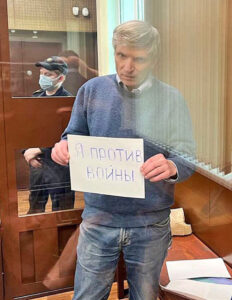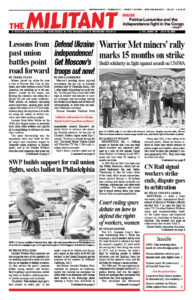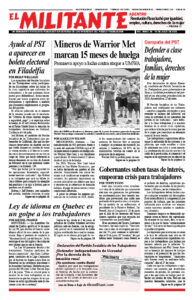Moscow’s invading forces captured Lysychansk, the last city in Luhansk province held by Ukrainian forces, July 3, after weeks of grinding but costly battles. The Russian forces used their wide edge in artillery and missiles to carry out systematic and devastating shelling that leveled Lysychansk and its twin city Severodonetsk, to drive back the tenacious Ukrainian resistance.
Russian President Vladimir Putin immediately ordered Moscow’s depleted forces to advance into adjoining Donetsk province, the last part of Ukraine’s Donbas region under Kyiv’s control. “Artillery is already hitting the city,” Slovyansk Mayor Vadym Lyakh told Ukrainian TV July 5. He urged civilians there to evacuate.
Kyiv’s forces control a good part of Donetsk, including three major cities, Slovyansk, Bakhmut and Kramatorsk, the headquarters of Ukrainian military forces in the east.
Moscow continues to punish Ukrainian working people for their resistance, ruthlessly bombing civilian areas in major cities across the country, like Kyiv, Kharkiv and Odesa.
A July 1 missile attack struck near Odesa, the main port in southern Ukraine, killing at least 21 people. The attack came a day after Russian forces were forced to abandon Snake Island. The strategic island had been an important part of Moscow’s control over the Black Sea and its blockade against Ukrainian grain exports. Whether Ukraine’s victory taking the island back will affect the blockade remains to be seen.
Ukraine supplies almost a 10th of the world’s wheat, 15% of its corn and 44% of global sunflower oil exports.
Ukraine forces advance on Kherson
“Ukrainians are fighting courageously, often arms in hand, to defend Ukraine’s national sovereignty and independence,” says a statement issued in March by Jack Barnes, national secretary of the Socialist Workers Party, on behalf of the party’s National Committee. “The Socialist Workers Party hails their resistance and calls for the defeat of Putin’s invading forces.” The party and others continue to distribute the statement widely, along with the Militant’s weekly coverage.
Kyiv’s forces are massed in the Mykolaiv region just to the west of Kherson, the southern port city just across from Crimea that has been occupied since March 2. Recent Ukrainian counterattacks have pushed Russian troops back from several towns to reach within 10 miles of the city.
Ihor Kolykhaev, the mayor of Kherson who has consistently refused to collaborate with the Russian occupiers, was seized June 28. He had been continuing to provide city services to the more than 100,000 people trapped there, who came to him for help as opposed to Moscow’s thugs.
There continues to be periodic forms of protest against the Russian occupation there, as well as partisan attacks on Russian forces.
Putin appointed a new administrator, Sergei Yeliseyev, to run the occupied territory around Kherson and preside over efforts at “Russification.” He is an official with Moscow’s Federal Security Service (FSB) political police agency. “Russia is here forever,” the Moscow-installed authorities said on the Telegram app.
Putin expands repression at home
Since the invasion of Ukraine, Putin has systematically ratcheted up repression and militarization at home. When his invasion was met by far-reaching protests across Russia, he retaliated with a brutal crackdown. At least 15,000 have been arrested since and thousands more harassed and threatened.

The regime recently escalated this in a flurry of high-profile detentions by the secret police. Not only outspoken opponents of Moscow’s war but also those open to freer exchange of ideas in academic institutions were among those targeted.
Vladimir Mau, a university rector just reelected to the board of Gazprom, which controls Russia’s gas production and pipelines, has been arrested for “fraud.” His Kremlin links and support for Putin’s “necessary decision” to invade Ukraine were not enough to protect him from becoming a target on suspicion of being a “systemic liberal.”
Ivan Fedotov, the star goalie for Russia’s silver medal ice hockey team at the February Beijing Olympics, was grabbed and whisked off by a group of men, some in masks and camouflage, as he was leaving practice in St. Petersburg on July 1. His apparent “crime”? He had signed to play for the Philadelphia Flyers in the U.S. as opposed to continuing to play in Russia.
He is to be charged with evading military service, which men under 27 are required to complete, and was taken to a naval base.
“We live in an increasingly authoritarian state,” said Oleg Mammadov, a 20-year-old member of the Libertarian Party, detained and fined for pasting up anti-war stickers in city streets. After a police raid on his home July 1 missed netting him, he is being hunted for spreading “fake news” about the Russian army.
Still opposition percolates. After an elite Russian fighting unit, the 331st Guards Parachute regiment based in Kostroma, northeast of Moscow, suffered initial heavy losses around Kyiv as Putin’s invasion suffered early defeats, online memorials to some 62 soldiers killed were publicly posted.
One unidentified Kostroma resident, expressing a widespread reaction by townspeople to the losses, said, “I feel sorry for each of these boys, but I don’t consider them to be heroes, I consider them to be victims” of Moscow’s disastrous war.

